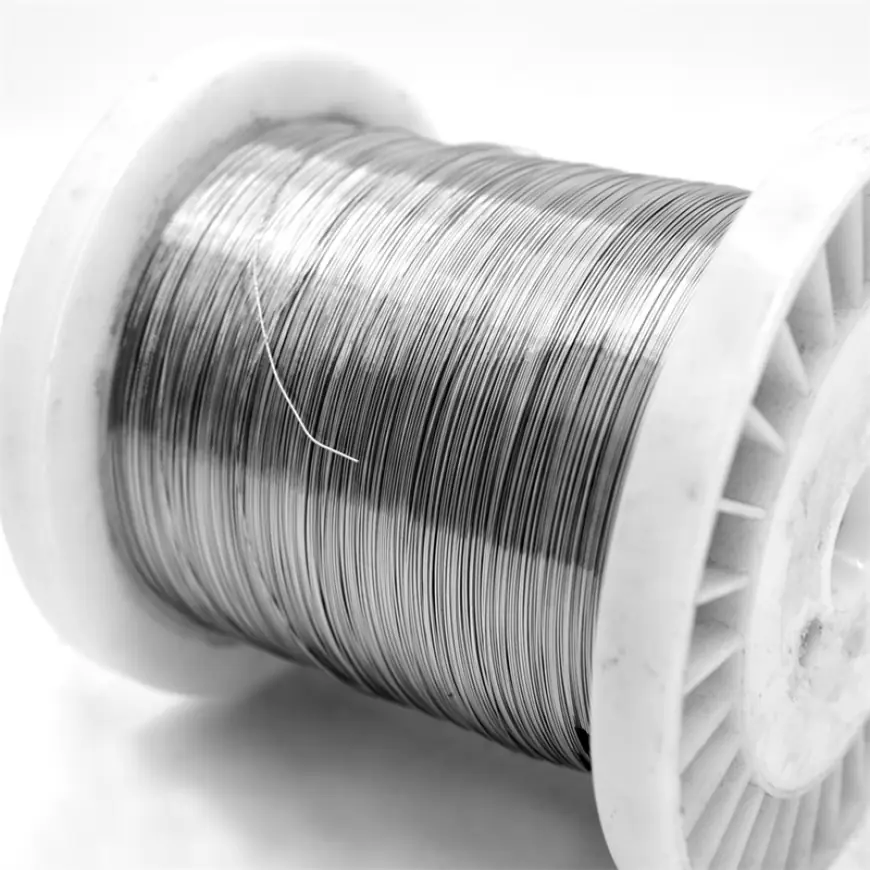Everything You Need to Know About Titanium Welding Wire
Learn about titanium welding wire, its properties, grades, benefits, and applications in aerospace, marine, medical, and chemical industries. Explore why it’s the top choice for high-performance welding.

Titanium has earned a reputation as one of the most reliable metals for engineering applications. It is lightweight, strong, and capable of resisting corrosion in extreme environments. Among the many uses of titanium, one that stands out is its role in welding. Titanium welding wire is an essential material for creating durable and high-performance welds, making it highly valuable in industries that demand precision and safety.
In this blog, we’ll take a deep dive into titanium welding wire—its characteristics, benefits, applications, and practical tips for welding titanium successfully.
What Makes Titanium Welding Wire Special?
Titanium welding wire is different from conventional filler wires because it is engineered to match the mechanical and chemical properties of titanium base metals. This ensures that the weld is as strong and resistant as the parent material.
Here are some standout features:
-
Exceptional Strength-to-Weight Ratio: Welds are strong without adding extra weight.
-
Superior Corrosion Resistance: Protects against saltwater, chemicals, and acids.
-
Biocompatibility: Safe for implants and medical applications.
-
High Temperature Endurance: Maintains strength even under extreme heat.
-
Durability: Ensures long-lasting service life in demanding conditions.
Types and Grades of Titanium Welding Wire
Different projects require different grades of titanium wire. Each grade has specific mechanical and corrosion-resistance properties.
-
Grade 1 – Pure titanium, soft and ductile, excellent for marine use.
-
Grade 2 – Most common grade, balances strength and corrosion resistance.
-
Grade 5 (Ti-6Al-4V) – Strong alloy widely used in aerospace and automotive.
-
Grade 7 – Titanium with palladium, excellent chemical corrosion resistance.
-
Grade 12 – Resistant to erosion and heat, ideal for chemical industries.
Choosing the right grade ensures weld quality and performance in different environments.
Manufacturing Process of Titanium Welding Wire
The production of titanium welding wire is a carefully controlled process:
-
Selection of Raw Titanium – High-quality titanium billets are chosen.
-
Melting and Alloying – Raw titanium is processed into ingots.
-
Hot Rolling and Drawing – The ingots are transformed into wire rods.
-
Pickling and Cleaning – Surface contaminants are removed.
-
Cold Drawing – Wire is drawn to precise diameters.
-
Finishing and Packaging – Wires are coiled or cut to size and packed to avoid contamination.
This process ensures the wire maintains purity, strength, and corrosion resistance.
Benefits of Titanium Welding Wire
Titanium welding wire provides several industrial advantages, making it one of the most sought-after filler materials:
-
Lightweight yet Strong – Perfect for aerospace and automotive industries.
-
Long Service Life – Reduced wear and tear in demanding environments.
-
Corrosion Resistant – Protects against rust in seawater and chemicals.
-
Cost-Effective – Reduces maintenance and replacement expenses.
-
Safe and Biocompatible – Widely accepted for surgical tools and implants.
Applications of Titanium Welding Wire
Titanium welding wire is used in multiple industries due to its reliability and versatility.
Aerospace Industry
Aircraft structures, engines, and turbine blades rely on titanium filler wire for lightweight, high-strength welds.
Marine Industry
Titanium’s ability to resist seawater corrosion makes it a preferred choice for ships, submarines, and offshore rigs.
Medical Field
From implants to surgical instruments, titanium welding rods ensure biocompatibility and safety.
Automotive Sector
High-performance cars use titanium welding wire for exhaust systems, suspension parts, and racing components.
Chemical Processing Plants
Heat exchangers, tanks, and pipelines that handle corrosive chemicals benefit from titanium’s durability.
Power Generation
Used in nuclear and conventional power plants for reliable, long-lasting welds.
Challenges in Welding Titanium
Despite its benefits, welding titanium is not simple. Here are some challenges:
-
Sensitivity to Contamination
Titanium reacts with oxygen, nitrogen, and hydrogen at welding temperatures. -
Need for Inert Gas Shielding
High-purity argon or helium is necessary to protect weld zones. -
Special Equipment Required
Welding chambers, torches, and purge setups must be used. -
Requires Skilled Welders
Only trained welders can ensure defect-free titanium welds.
Best Practices for Welding with Titanium Wire
To achieve strong, defect-free welds, these practices are crucial:
-
Always use 99.999% pure argon shielding gas.
-
Clean titanium surfaces with acetone or alcohol before welding.
-
Use back purging to prevent oxidation on the backside of welds.
-
Match filler wire grade with the base metal.
-
Avoid overheating to prevent brittleness.
-
Ensure a clean working environment free of dust and oils.
Why Industries Choose Titanium Welding Wire
Industries prefer titanium welding wire because it guarantees:
-
High-performance welds that meet critical safety standards.
-
Versatility across aerospace, marine, medical, and chemical fields.
-
Reduced weight with maximum strength for engineering designs.
-
Cost savings due to reduced downtime and repairs.
The Future of Titanium Welding Wire
Titanium welding wire is expected to play a greater role in the future as industries demand lighter, stronger, and more sustainable materials. Developments in automated welding, 3D printing with titanium wire, and new titanium alloys will expand its applications even further.
From renewable energy to space exploration, titanium welding rods will remain at the heart of innovation.
Conclusion
Titanium welding wire is much more than just a filler material—it is a vital component that ensures reliability, safety, and durability in critical applications. Its high strength, corrosion resistance, and lightweight properties make it indispensable for industries like aerospace, marine, automotive, medical, and chemical processing.
While welding titanium presents challenges, the benefits it offers make it well worth the effort. By using the right grade, following best practices, and ensuring proper protection against contamination, industries can achieve welds that last a lifetime.
If your project demands strength, durability, and precision, titanium welding wire is the solution you can rely on.
What's Your Reaction?
 Like
0
Like
0
 Dislike
0
Dislike
0
 Love
0
Love
0
 Funny
0
Funny
0
 Angry
0
Angry
0
 Sad
0
Sad
0
 Wow
0
Wow
0
















































